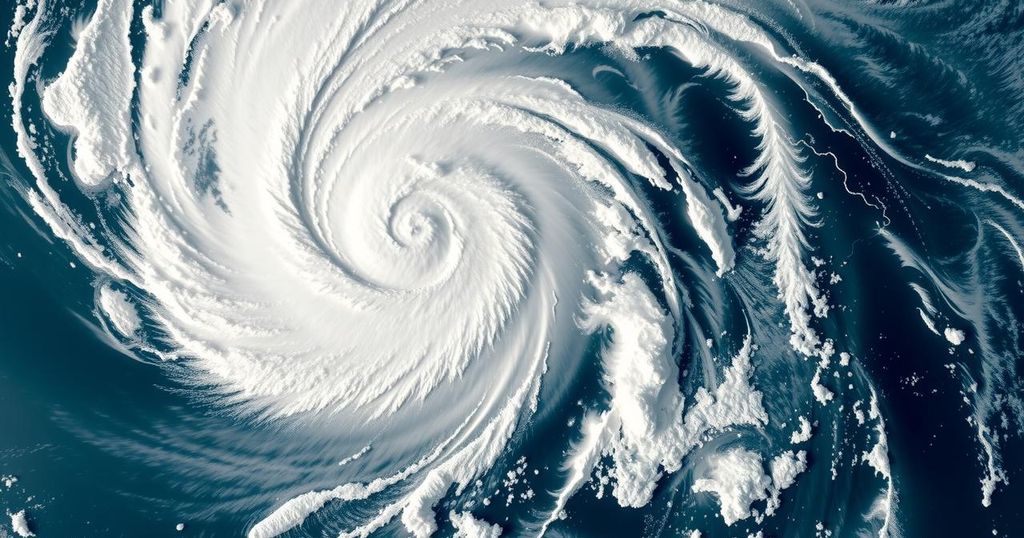World news
AFRICA, CENTRAL EMERGENCY RESPONSE FUND, CHI, CLIMATE CHANGE, DISASTER MANAGEMENT, ERATI, FLOODING, HUMANITARIAN AND EMERGENCY OPERATIONS CENTRE, MOZAMBIQUE, NAMPUL, NAMUNO, NATURAL DISASTER, NATURAL DISASTERS, NIASSA PROVINCE, PEMBA, SADC, SHOC, SOUTHERN AFRICAN DEVELOPMENT COMMUNITY, TOM FLETCHER
Amira Khan
0 Comments
Tropical Cyclone Chido: Ongoing Humanitarian Crisis in Mozambique and Malawi
Tropical Cyclone Chido has made landfall in Mozambique, affecting thousands with strong winds and substantial rainfall. An emergency fund of $4 million has been allocated for response efforts. Preliminary assessments indicate over 24,100 individuals are affected, with significant devastation seen in Cabo Delgado, particularly in Mecufi. The cyclone’s impact continues to spread as it approaches Malawi, emphasizing the need for robust humanitarian efforts.
Tropical Cyclone Chido has recently made landfall in Mozambique and is now impacting Malawi with severe winds and torrential rainfall, affecting thousands of individuals. The Emergency Relief Coordinator, Tom Fletcher, has allocated $4 million from the Central Emergency Response Fund to support the urgent response efforts in Mozambique. Emergency assessments are being conducted by various governments and humanitarian partners, despite challenges arising from communication failures and impassable routes due to the cyclone’s destruction.
On December 15, Tropical Cyclone Chido struck Mozambique, producing winds of up to 80 km/h and rainfall amounts surpassing 250 mm within a 24-hour timeframe. The Southern African Development Community (SADC) estimates that the cyclone has resulted in at least one fatality, injured 35 others, and directly affected over 24,100 people across 4,835 families. Additionally, over 5,800 homes have been destroyed, alongside partial damage to 41 classrooms and the collapse of power poles, affecting approximately 2,500 families.
Early assessments indicate that around 160,000 individuals in Cabo Delgado require immediate assistance, with the region’s capital, Pemba, housing a significant portion of those in need. Mecufi has been identified as the area most severely impacted by Chido, compounded by blocked roads and communication failures. According to the National Institute of Meteorology (INAM), regions within Cabo Delgado and Niassa continue to experience heavy rainfall, with strong winds anticipated in Pemba. The cyclone has caused significant power outages and communications issues in various sectors, highlighting regions such as Chiure and Montepuez as notably affected.
As of December 16, Chido is advancing inland through Mozambique and Malawi, classified at a minimal stage of a moderate tropical storm. The cyclone’s center has moved over southern Malawi, bringing further rain and wind, with expectations that Chido will dissipate near Zimbabwe the following day. In Malawi, initial reports indicate that approximately 1,800 households, affecting around 8,100 individuals, have suffered due to severe weather, particularly in districts like Machinga and Phalombe.
The cyclone passed near the Comoros islands on December 14, with lesser wind impacts than in Mayotte. Projections indicate that heavy rain, exceeding 150 mm over a ten-day period, will affect northern Mozambique, Malawi, Zimbabwe, and Zambia, with potential risks of flash floods and mudslides also affecting regions in Angola, Botswana, the Democratic Republic of the Congo (DRC), Eswatini, Tanzania, and South Africa. Chido developed into a tropical depression on December 7 and intensified to Category 4 before weakening again to Category 3 on December 13, traversing areas close to Madagascar.
The adverse impacts of Tropical Cyclone Chido are part of a broader trend of severe weather events which have increasingly threatened the Southern African region, particularly in the context of climate change and its effects on weather patterns. This cyclone is one in a series of storms that have intensified in recent years, necessitating robust disaster response mechanisms and international cooperation to safeguard vulnerable populations. The UN Office for the Coordination of Humanitarian Affairs (OCHA) continues to monitor such crises, facilitating emergency responses and providing crucial funding for relief efforts during natural disasters.
In conclusion, Tropical Cyclone Chido poses a severe humanitarian crisis in Mozambique and Malawi, affecting thousands with significant infrastructural damage and loss of life. Emergency funding and coordinated assessments from humanitarian organizations are crucial to address the immediate needs of the affected populations. The ongoing monitoring of rainfall patterns in connection to Chido underscores the need for preparedness against potential flooding and mudslides in the broader Southern African region as the cyclone continues its trajectory.
Original Source: reliefweb.int




Post Comment